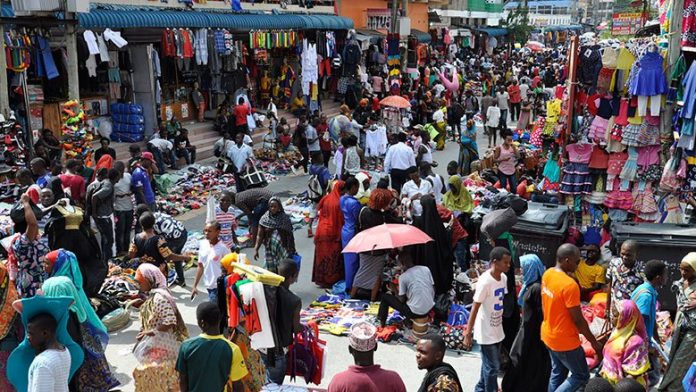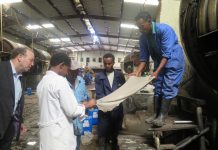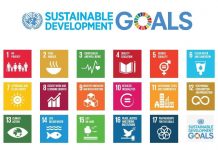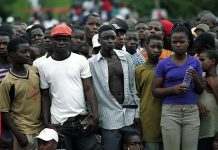Like other regions, Sub-Saharan Africa has not escaped from this phenomenon of rising youth unemployment. According to the OECD and the African Development Bank, young people (under the age of 25) make up slightly more than a third of the region’s total labor force, but account for about 60 percent of total unemployment. On average, 72 percent of the youth population lives below the $2 a day poverty line, according to a World Bank Survey.
These high levels of unemployment often create a feeling of hopelessness and desperation among youth, and these are psychological variables that terrorist organizations use in recruiting their members. So it is not surprising that Sub-Sahara Africa has of recent come under the spotlight as a breeding ground for terrorism, with the insurgency of groups like Ansar Al-Dine in Mali, and Boko Haram in the northern parts of my country Nigeria, Cameroon, and Niger.
However, unlike other regions of the globe where this phenomenon of rising youth unemployment can be closely linked to economic downturn and slow GDP growth, Africa’s economy has been thriving. In the past decade, the growth of Sub-Saharan African economies, averaging about 5 percent per annum, has outpaced global growth of about 3 percent annually.
Why then is this region, which has been doing so well for more than a decade, experiencing this phenomenon of “jobless growth”? Why is it that the vast majority of our youth are yet to be included in this economic growth? My concern is that if this trend is not checked, its effects could arrest Africa’s progress towards peace and security and in so doing disrupt our economic development, like the civil wars of the 80s and the 90s.
I believe the answers to these questions lie in a number of critical issues confronting the continent, which I would like to bring to the forefront.
First, the pattern of growth is highly unequal. In other words, growth is fast but inequality has increased. Take the case of Nigeria, Ethiopia, and South Africa – three fast growing African countries over the last decade. Latest World Bank data available show that the Gini Coefficient – a measure of inequality in income distribution among individuals – has worsened over the last decade. In Nigeria, the coefficient rose from 42.9 in 2004, to 48.8 – where 100 implies perfect inequality by 2010. Likewise in Ethiopia, the coefficient rose from 30 in 2000 to 33.6 by 2011. In South Africa, the coefficient rose from 57.8 in 2000 to 63.1 in 2009. Such disparity in equality fuels social tensions and violence in the society.
Second, while it is true that economic growth is a pre-requisite for job creation, the sources of growth may not create many new jobs. African economies have not really transformed, as several countries still depend primarily on commodity exports, and manufacturing is low. Natural resources like oil and various minerals account for nearly a quarter of the region’s GDP, and continue to be a significant driver of growth on the continent.
Africa’s natural resources output is set to increase as new oil deposits are being discovered in countries like Ghana, Uganda, and Kenya, while the extraction of other minerals (like iron ore) is set to accelerate in countries like Guinea and Sierra Leone. The IMF projects that oil-exporting countries in Sub-Sahara Africa will experience a relatively stronger growth on average of about 6.6 percent in 2013 – higher than the region’s overall growth rate of 5.4 percent.
However, in spite of contributions to economic growth, the natural resources sector are not labor-intensive and do not generate sufficient jobs to minimize the impact of this jobless growth phenomenon.
Manufacturing activity, which can potentially create millions of jobs across Africa, is still quite low. In fact, Sub-Saharan Africa’s share of manufacturing GDP is declining and is less than half of the average for all developing countries.
Third, our human capital is inadequate, as there is a mismatch between demand and supply in our labor markets. On the one hand, the ILO estimates that about 133 million young people in Africa, or 50 percent of its youth population, are uneducated and lack the basic skills to be competitive in the labor force. On the other hand, even those who are educated continue to work in low-productive jobs, mostly in the informal sector of the economy because of their inadequate skills level.
According to the African Development Bank, about 5 million graduates are produced annually by African universities, but the mismatch between the skills they have acquired and those required by the private sector to create sustainable jobs is fueling a phenomenon of the educated unemployed.
Fourth, there are no safety nets, and this leaves the unemployed highly vulnerable to poverty. In many countries, the information required to better target the poor and the unemployed is not available. We lack sound identification data and biometrics that can support safety nets. We lack effective tax systems that can help redistribute income in favour of those at the bottom end.
Fifth, Africa has a demographic challenge – its youth bulge. According to UN population statistics, the median age on the continent is 19.7 years, compared with 27.6 in Latin America and the Caribbean, 29.1 in Asia, 37.2 years in North America, and 40.1 in Europe. Nearly 70 percent of the continent’s population is aged below 25. As a result, Africa’s labor force has been growing strongly, expanding by 91 million over the past decade, yet only 37 million of the new entrants were employed in wage-paying jobs, according to the McKinsey Global Institute.
With yet a very high fertility rate and this demographic composition, Africa’s labor force is projected to rise by 122 million between 2010 and 2020, creating a continent-wide labor force of 500 million by the end of the decade. Clearly, this raises the challenge of job creation. And whilst jobs are being created in Africa’s economies, they are not being created fast enough to absorb the millions of new entrants into the labor force.
In spite of these challenges, I am very optimistic about Africa’s future and the potential of its youth. I believe the region can continue on its fast growth trajectory and turnaround this trend of “jobless growth” into “job-fueled growth,” and by so doing, tackle the imminent threat to peace, security, and development on the continent.
So how do we solve this problem? We need to act fast and act smart. We need to mainstream youth employment as a core strategic objective of development, and we need to tackle issues raised with both short and long-term solutions. Let me start with the real long-term solutions
First, it is necessary that Africa’s economy continue to grow, and even faster perhaps in the double digits, to keep pace with population growth. And to ensure this, we must look beyond the reliance on primary commodity exports and natural resources. We must diversify our economies by focusing on alternative sources of growth and job creation. We need to add value to Agriculture and other commodities. We need to develop manufacturing and petrochemicals and other sectors that can grow our economy faster.
We need to intensify efforts at improving our investment climate to ensure that the private sector can thrive and create jobs. In this regard, it is important that we fill the infrastructure gap, which is costing the African economy at least 2 percent in GDP growth annually. We need to join hands with the private sector and invest proceeds of our natural resources in critical infrastructure like power, roads, rail, ICT, and water and sanitation. We need to develop our financial systems to provide flexible and timely credit. We need to develop capacity for entrepreneurship, especially among the youth, as a major driver of job creation.
Second, it is crucial that our youth are not only educated but that the quality of education they receive address the skills mismatch. We must develop our human capital in Africa. We need to improve access to basic education, especially for girls and women.
Third, we need to build safety nets. We need to develop identity platforms and biometric systems that will facilitate the development of safety nets for the poor and the unemployed. We need to build a tax system that can efficiently redistribute income to those at the bottom end.
Fourth, the reality is that Africa needs to consider controling its population growth. This is an option that I believe we have not discussed enough. China’s much-reviled One Child Policy was crucial to its current economic success. I’m not suggesting we follow this but we Africans must now begin to look for our own home-grown policies that would manage our population growth in a way that whatever economic growth we achieve can be poverty-eradicating and more inclusive.
I also believe that women and girls education is key here, given the implications on family planning. Africa is urbanizing rapidly and our spatial patterns of growth must be looked at to create more urban infrastructure and opportunities.
Fifth, while our youth bulge can be viewed as a threat to our economic development, it can also present unique demographic opportunities or dividends, depending on how it is managed. I propose that we see our youth bulge not as a threat but as a catalyst for economic transformation as the “Asian Tigers” did.
In the 1940s, the Asian Tigers, such as South Korea, found themselves in a similar situation that Africa is in today. They had a very young population and built their economies on the backbone of this young labor force. The Koreans developed a program of “education for economic growth” focused on investing in skills and education for the youth to power industrial revolution and economic growth. They were able to transit from a developing to a developed economy by investing in their young labor force.
Africa’s youth bulge, if properly harnessed can also power economic activity over the next 30-40 years, as in Korea’s case. In the short term though, we need to introduce job-creation programs, given the severity of the problem, and the urgency with which it must be dealt with.
To conclude, let me borrow the words of Kofi Annan to say that “no one is born a good citizen, no nation a democracy. Rather, both are processes that continue to evolve over a lifetime. Young people must be included from birth. A society that cuts itself off from its youth severs its lifeline: it is condemned to bleed to death”.
Ngozi Okonjo-Iweala is finance minister of Nigeria. The above is an edited version of the Oppenheimer lecture that she gave in London at the International Institute for Strategic Studies on June 19, 2013.













